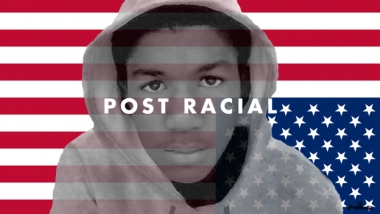The pejorative term that is ‘post-racial’ has seemingly been a common fixture in American society since the emergence of President Barack Hussein Obama, as the first African-American president. Though representing a milestone in race-relations, the notions of race-transcendence has become an ingrained fallacy in the minds of many – especially in some representatives of the American political spectrum, who believe that the hostilities of race are less blatant and a kind-of, sort-of socio-economic and political playing field has been provided to the historically disenfranchised and perpetually marginalized. With this ideology, the notions of post-racialism and universalism are now applied, and the race-specific and civil rights policies that many African-Americans fought and died for are now becoming diluted.
For example, most recently in April, the U.S. Supreme Court upheld the University of Michigan’s ban on affirmative action in public college admissions, which ultimately thwarts the diversity-flow in its school. In 2013, the Supreme Court also abolished the Section 4 preclearance of the Voting Rights Act of 1965, which now allows nine Southern states the ability to alter their voting regulations without federal approval.
With these subsequent color-blind changes in civil rights policies, it is a fear among many African-Americans that these initiatives in the future will ultimately be castrated; thus possibly inversing African-American rights to that of the state prior to which these policies were instituted.
The call for post-racial policies aims to be a tool to transcend the notions of race under the guise of ‘progressive’ politics. Race-neutral politics essentially promotes a newly-found universality, in which everyone is considered to be politically, socially and economically inclusive, centered and where race-specific initiatives are excluded from the political conversation. The question that must be answered is: who is ultimately benefitting from these so-called progressive/race-neutral policies? Certainly not members of the Black community. Just as political scientist and author Frederick C. Harris states in his book, ‘The Price of the Ticket: Barack Obama and the Rise and Decline of Black Politics” “not every issue facing Black communities fits under the rubric of universalism.” (Harris, 2012) Although Harris notes that issues such as access to healthcare or ‘tuition free-education at public colleges and universities” (Harris, 2012) are clearly inclusive to all Americans, he also poses excellent questions to combat the idealism of universal politics when made applicable to the Black community.
He writes:
“But what should be the political strategy for issues that overwhelmingly disproportionately affect blacks such as mass incarceration? What, for instance, would a national anti-racial profiling act – a law that would ban [and] prohibit police from profiling individuals because of their race – look like under the principle of universalism? Does the principle of color-blindness in advocating issues and policies that are rooted in racial bias actually continue to perpetuate racial inequality by ignoring it or burying it under the rug? And does ignoring the persistence of racial inequalities capitulate to the idea that the United States has become a color-blind society, a concept that declares that race does not – or should not – matter in law and policymaking?” (Harris, 2012)
Ultimately, with this new wave of policymaking, a non-racialized or deracialized approach to politics is applied; essentially disregarding and “disrupting the observance of [racism]” (Gilroy, 11) as a perpetually crippling phenomenon in an institutionally racist American paradigm. These policies also ignore the historical remnants and current manifestations of systematic racism against African-Americans, which is embedded in every facet of society. Therefore, the absence of race-consciousness is therefore racism, as it denies social justice to those deliberately, historically and consistently bastard by the system. (Morris, 2014)
If race-consciousness and race-specifity were acknowledged in the American political sphere, it would imply a systematic flaw within the societal, political and economic paradigm of the United States, and not merely a defect in some of the individuals that comprise it – which is why race-specifity will not be applied on a universal scale. (Morris, 2014) Therefore, to many scholars, the call for post-racialism is not a call for post-Jew; post-Hispanic/Latino; post-Asian/Pacific Islander; post-gender; post-women’s rights or post-immigration or post-LGBTQA (because the rights of those listed are currently recognized and not mitigated) but rather post-Black — as it aims to deny historical and contemporary white supremacy as a ramification(s) for the present socio-economic and political prejudices and inequities many African-Americans still face in 2014.
But many will disagree to this reasoning and will cry and apply the ideologies of liberalism and behavioralism as the reasoning for the current state of many African-Americans; citing perhaps lack of productivity, laziness, idleness, inferiority, ignorance, preference for leisure and instant gratification as to why many people of color are in the predicament they are presently in. But can lack of productivity incite perpetual gentrification or the mass closures of schools in urban America? What about the increase in prisons and the mass incarceration of Black males? How about a crippling education system in predominately Black communities? Is the contemporary resegregation of schools also attributed to lack of Black productivity? What about stop and frisk? Oh, and can someone explain what has caused African-American unemployment to double that of white-Americans in the last five years, even if the African-American is college-educated? Is this attributed to Black idleness and inferiority too?
And post-racial policies are to be applied when these issues in the Black community continue to be overlooked and unaddressed?
Post-racial my ass.
References:
Giloy, P. (2000). Against Race: Imagining Poltical Culture Beyond the Color Line . Boston : Harvard University Press .
Harris, F. C. (2012). The Price of the Ticket: Barack Obama and the Rise and Decline of Black Politics . Oxford: Oxford University Press .
Morris, L. (2014 ). Introduction to Black Politics: Graduate Course Notes . Howard University, Department of Political Science .
